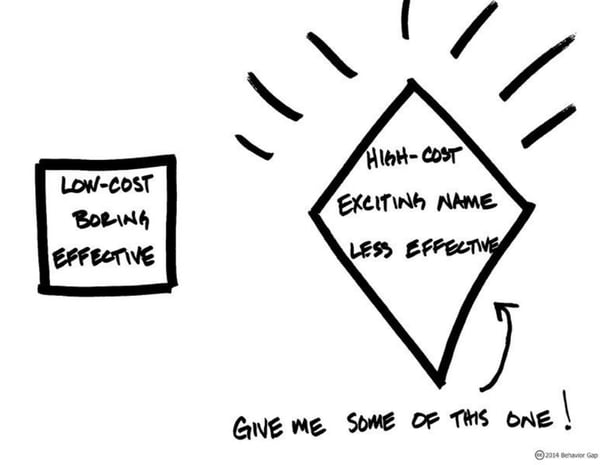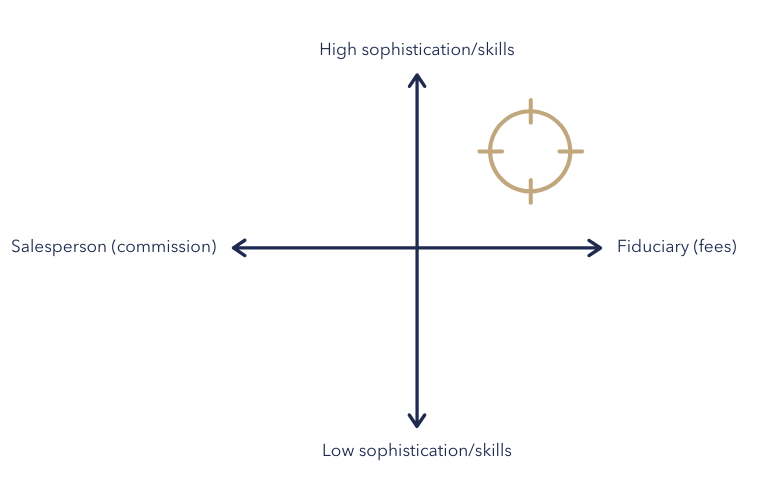The industry's reputation has made investors uncomfortable so you can't be blamed for not knowing who to trust.
If you're a senior international professional in the Middle East, you'll understand this all too well.
Financial salespeople often act in their own best interests, not yours.
So what are the signs to look out for?
How will you know who to trust?
Most people I meet have financial ‘trust’ problems.
It’s comically depicted here.
We’ve all had bad experiences in the past.
My grandmother trusted a stockbroker in a pin-striped suit.
My parents, a ‘charismatic IFA’ who’d visit their house or meet my father at his office or golf club.
Mine began when my local bank encouraged me to invest in ‘tech’ stocks just before the dot com crash.
It left me distrustful, fearful of investment and confused, preferring property or cash to repeating my mistakes.
Clearly, none of these methods worked.
Human behaviour is easily manipulated by misplaced ‘friendships’, family advice, media noise, suave sales or just greedy banks.
Regardless of website promises, in my experience, the best place to start is with the fundamental assumption:
No one cares about your finances as much as you!
Caveat Emptor.
Always take personal responsibility and do a little legwork to understand the fundamentals.
After all, “time spent in reconnaissance is seldom wasted”.
(As my squadron leader used to drum into me).
From this position of safety you can begin to untangle the deliberately complicated web of names, titles and types to decipher what financial advice or service may be best for you, if any.

One blog on this topic irritated one reader who commented:
“You’re all the same.”
But are we?
It’s certainly true that to some extent, everyone other than yourself is conflicted (and the truth is that you’re biased).
All human beings are incentivised to act in a certain way.
When faced with evidence that conflicts with what we think is in our best interests, we often either ignore it, or strive extra hard to counter it.
In my view, it’s the understanding and management of these conflicts that will likely give you the best opportunity for investment and life success.
So how can we be sure someone’s acting in our best interest?
Fortunately, there are two camps.
Non-fiduciaries and fiduciaries.
Commission-based advisers (paid by the product company) and fee-based advisers (paid by you).
I think of the split as mercenaries and missionaries.

‘Fiduciary duty’ may not sound life-changing but understanding it can mean the difference between a dream retirement on a beach and living on benefits.
What is a fiduciary?
A fiduciary is legally and ethically bound to act in another person’s best interests, not their own.
In summary they:
- Put their clients’ best interests before their own
- Seek ways to maximise their clients’ money
- Act in good faith and provide all relevant facts
- Avoid and disclose relevant conflicts of interest
- Do their best to ensure they provide accurate and thorough advice
The term usually refers to someone who manages assets on the behalf of an individual, family or company.
Situations requiring total trust, good faith and honesty.
This certainly seems a far better place to begin than considering taking advice from a non-fiduciary.
Believe it or not, most banks, wealth managers, brokers and independent advisers around the world have no such standard to uphold.
They simply act on behalf of the product provider to maximise their returns not yours.
If a structured product pays them more – you’ll get it.
If a stock or fund pays them a backhander (retrocession) – you’ll get it.
In fact, you’ll likely get whatever product or suite of products pays them the most commission that day.
In order to fund this commission, you also get locked-in with exit penalties so you can’t get out.
How to choose a fiduciary
A fiduciary in Dubai is like a hen’s tooth.
A financial salesperson is far more common.
Being the only certified fiduciary in the Middle East, Asia and Africa; we have the opportunity to begin to change this marketplace.
To transform through education not speculation.
To innovate through science not spin.
To pioneer a profession not promulgate the industry.
Unlike professions such as law and medicine, any salesperson can call themselves a financial adviser.
Very often these salespeople find clients through cold-calling - an outdated technique used by the traditional financial services industry to sell you a product and make a commission.
Trust me, professionals don’t cold call and not everyone needs financial advice (at least not all of the time) but there’s no one who wouldn’t benefit from financial education.
Start making wiser decisions about both life and money and receive weekly content curated by our experts.
Each piece is designed to help you get clarity, confidence and control over your ideal future.

